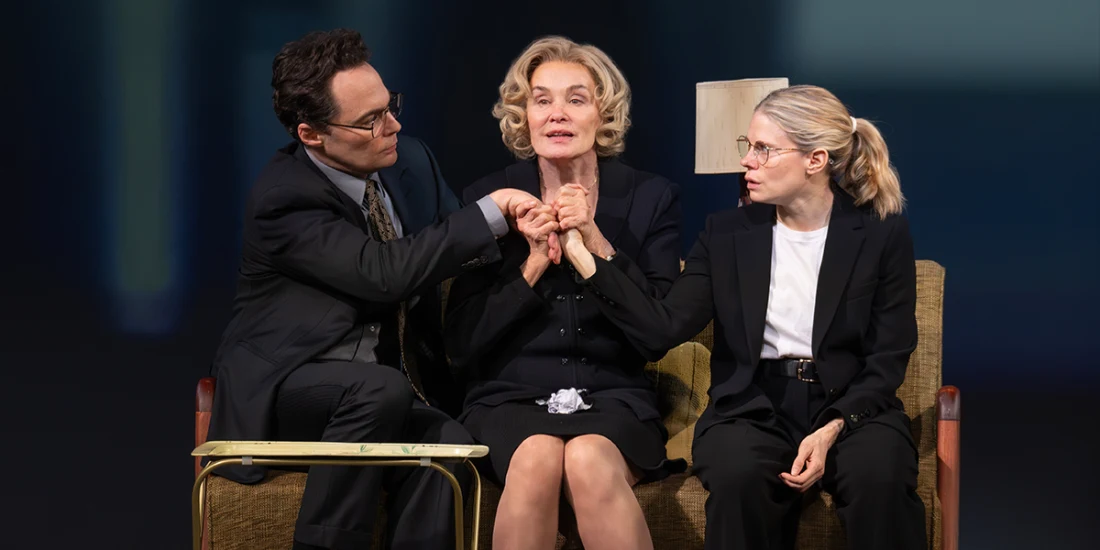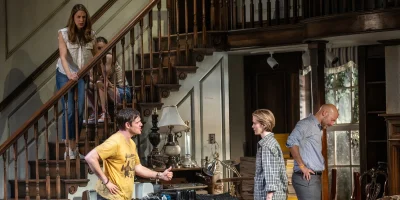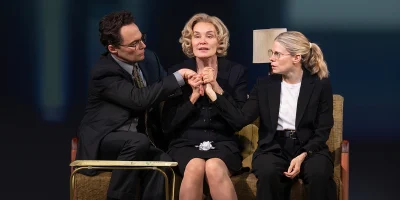
Meet the celebrity-led, Tony-nominated ‘Mother Play’ Broadway cast
Jessica Lange, Jim Parsons, and Celia Keenan-Bolger were all Paula Vogel's first choices to portray characters based on the playwright's own family members.
Three’s a charm. For the cast of the stirring family drama Mother Play – a starry trio composed of Jessica Lange, Jim Parsons, and Celia Keenan-Bolger – that's especially true: All the actors are up for 2024 Tony Awards for their critically acclaimed performances.
Playwright Paula Vogel (Pulitzer Prize winner How I Learned to Drive) mined her own family history and the universal need for a sense of home for the Tony-nominated new work with a telling subtitle: A Play in Five Evictions. She also thought long and hard about who’d portray characters based on her mom, her brother, and herself.
Beginning in 1962 outside Washington, D.C., Vogel's dive into the past traces four long decades and ever-deepening dysfunction. Alcohol-addled Phyllis seeks to keep her free-spirited son, Carl, and forthright daughter, Martha, firmly under her thumb — only to lose touch with them in every sense as they embrace themselves for who they are.
Lange has won two Oscars, Emmys, and a Tony for her wide-ranging stage and screen work. Parsons is a four-time Emmy winner for The Big Bang Theory, and Keenan-Bolger is a Tony winner for To Kill a Mockingbird.
“Jessica was the first name I thought of,” said Vogel, noting that the actress has the needed ferocity for Phyllis. “I told Celia years ago I was writing a play with her in mind.” And Parsons’s name “came up first,” she said, when her script was finished.
Now, Vogel's dream team seamlessly came together in director Tina Landau’s staging, currently at Hayes Theater through June 16 to cap off Second Stage Theater's 2023-24 Broadway season. The cast spoke to New York Theatre Guide about their experiences with Mother Play.
Were you aware that you were on Paula Vogel’s mind for Mother Play?
Jessica Lange: We never actually talked about that, so I wasn’t. But I wanted so badly to do a new play. I've done A Streetcar Named Desire. I’ve done The Glass Menagerie. I’ve done, of course, my favorite part ever, Mary Tyrone in Long Day's Journey into Night.
I really wanted the experience of doing something that hadn’t been explored before and to create a character for the very first time. I also wanted to work at the Hayes Theater because I love that theatre. It’s like a little jewel box.
Everything fell into place. It was a perfect storm.
Jim Parsons: I only found out I would play Carl when the offer to do so came in. Celia and Jessica were both already cast. I am, of course, thrilled and honored that Paula thought of me but, to be frank, I was so excited to be in a new Paula Vogel play that I would have happily done it even if she’d been forced to let me play Carl against her will. Certainly I’m pleased that’s not the case.
Celia Keenan-Bolger: Back when Second Stage first acquired the Helen Hayes Theater [in 2015], the artistic director Carole Rothman held a press event on stage and announced that they would produce one new Broadway play by an American playwright every year. Paula Vogel was one of those playwrights.
After the event, Paula found me and said she was writing something for me. I was both overcome with disbelief and excitement and aware of how rarely these things actually work out. But every time I saw her after that she’d mention it. And then early last year I got an email from her saying, “Here is your play.”
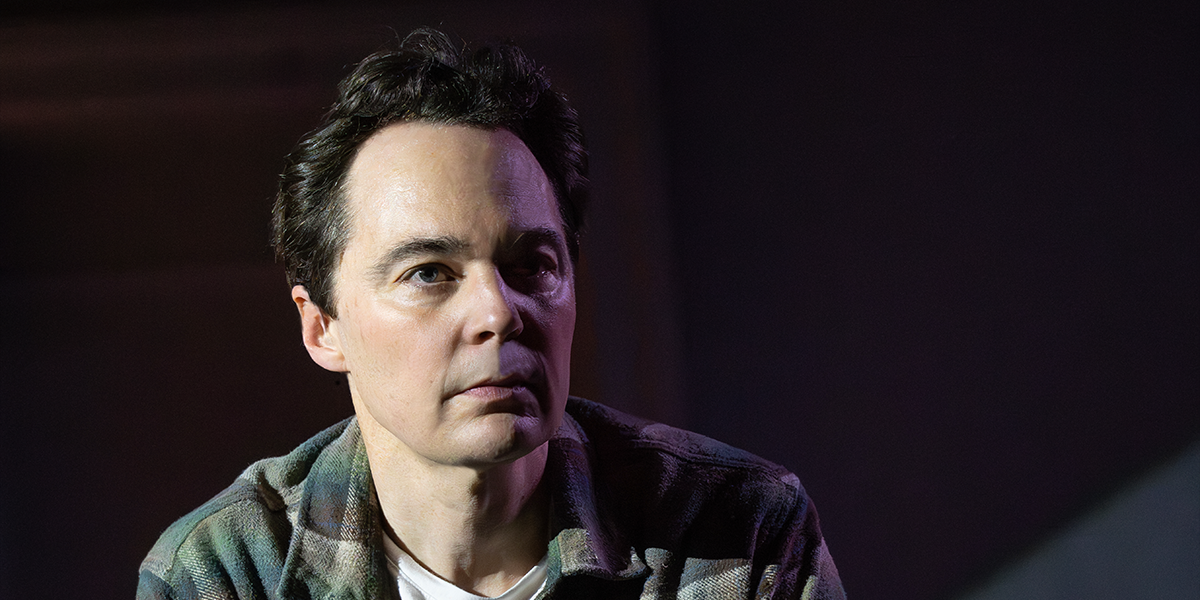
Did you have questions for Vogel as you prepared for the play?
Lange: The way Paula writes, it’s on the page. We did fill in the blanks about Phyllis’s history, where she grew up, and family heritage. But what Paula put on the page was so precise that I didn't feel like I needed to question her a lot about motivation.
What appealed to me when I read the play is that Phyllis had no boundaries. Doing the play, what's really thrilling is the velocity of the emotions. Phyllis doesn't hold back. If she's angry, it’s rageful. If she’s sad, her heart's breaking. Those kinds of parts have always appealed to me.
Parsons: The first thing I noticed and responded to about Carl was that he was written with so many different colors, as it were, and that he showed so many different emotions throughout the play. In many ways, Tina was the most helpful person to me with regards to discovering Carl. She continually encouraged me to go farther and deeper with my interpretation of all those colors I was talking about that Paula had written for Carl.
I would add that, in the case of Paula, she was almost shockingly generous in her ability not just to offer information about her family and Carl, but also in the way she always made me feel like this was my Carl – not some replica or imitation of a person so dear to her.
Keenan-Bolger: I wanted to know as much as I could about her real family, especially her maternal lineage. I remember thinking that I'd try to model Martha off of Paula's grandmother, who sounded like a real badass. Throughout rehearsals we looked at photographs of the different apartments where they lived and I studied how the family related to one another in those photos.
Jessica Lange recently said to me that a huge part of great acting is a fertile imagination, and I keep thinking about how to keep stretching mine. I had this foundation of information about the Vogel family, but then I also read a lot of Virginia Woolf, Audre Lorde, and Alison Bechdel to try and fill in some of Martha’s interior life.
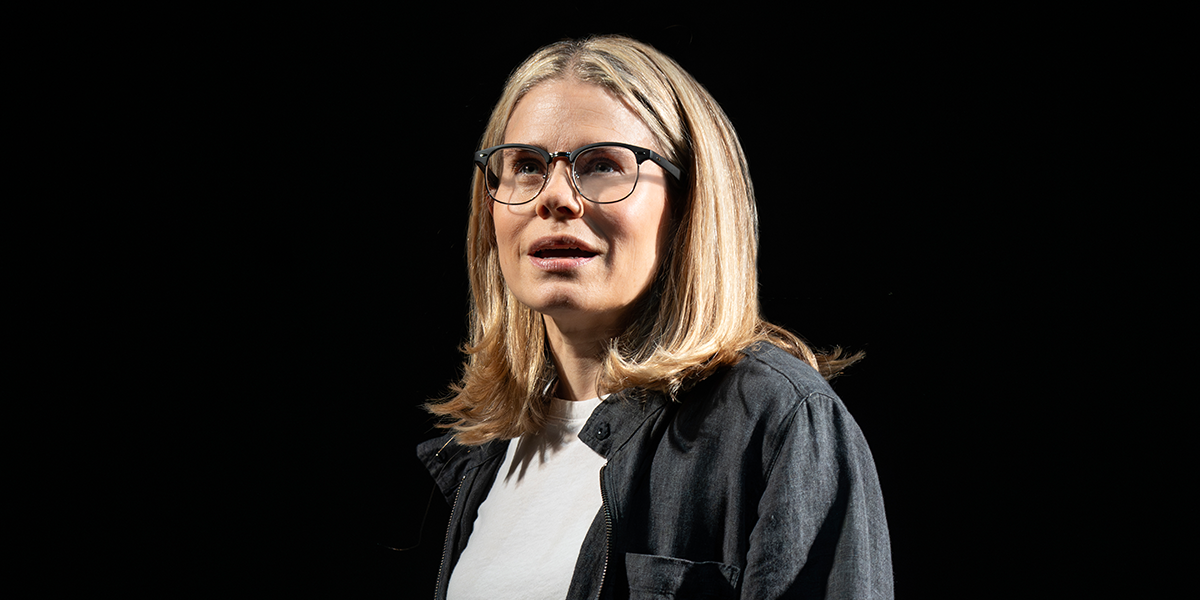
Do you have a favorite moment in Mother Play?
Lange: One of the most attractive things about doing this part is the idea of creating a character who moves through four decades of her life. And in doing it without all the tricks that we have in film: prosthetics, makeup, wigs, and costumes. It all had to be incorporated in body, voice, and energy levels. That’s extremely interesting to explore.
Parsons: I can’t say I have a specific moment in the play that is my favorite. One of the joys of being a part of this story is the way it zigs and zags all over the human emotional spectrum, and the speed with which it does so at times.
As a general "favorite," though, being on stage in such an intense [relationship] with Jessica and Celia would be my answer. I will not leave this production the same actor I came in as, and being with those two on stage is a large part of the reason why.
Keenan-Bolger: My favorite moment of the play is always changing. When we started performances, it was the scene where Carl is leaving for college and he tells Martha to stay out of the house. Last week it was watching Jessica navigate the emotions in the scene where she evicts Carl for the last time. This week, who knows?
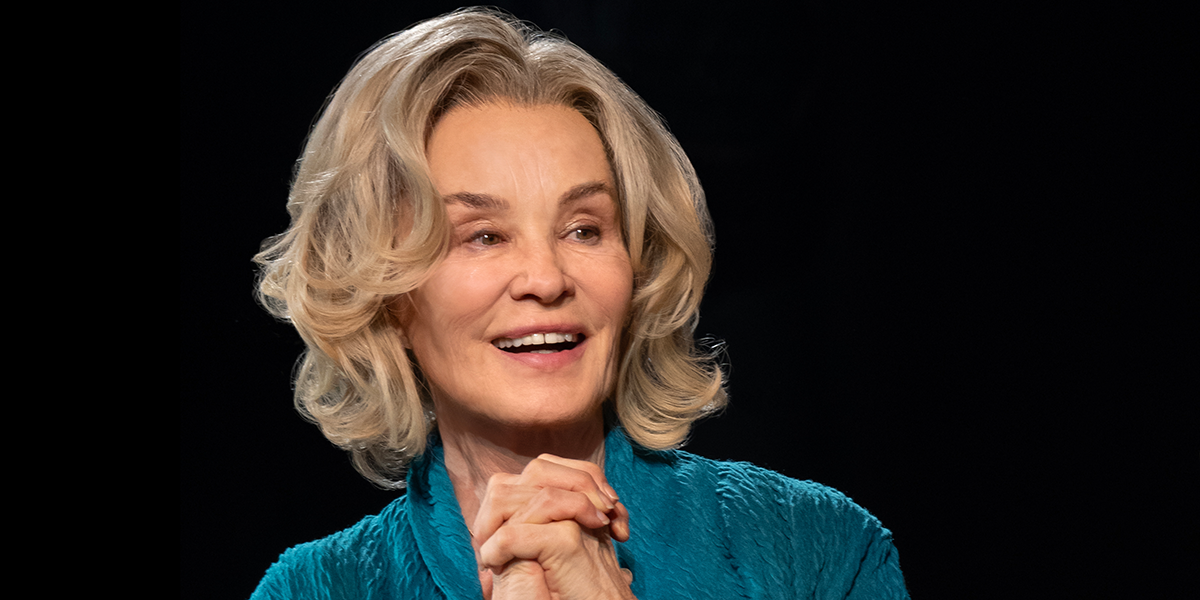
What was your reaction to the whole cast being nominated for Tony Awards?
Lange: It’s absolutely thrilling. That was the best morning. I turned my phone on and there were the "congratulations," "congratulations," congratulations." And I got to one text that said, "Celia and Jim are nominated," and I let out a huge whoop. I was so happy. It’s an ensemble play. You don't do it without the others.
Parsons: It feels like all three of us being nominated for Tonys for this three-person play is territory I may never come across again as an actor. It’s an honor and also very lucky, but it’s also such a lovely symbol of the ensemble nature of our relationship.
Keenan-Bolger: This is my fifth nomination, but it means something different because Jim and Jessica and I were all recognized. I know there are only three of us, but it feels historic that every member of the cast got a nomination.
I like thinking about the fact that Paula was able to create three very different characters who are so vividly drawn that the actors who portray them all got recognized. I'm also so grateful to the nominators because our play, our system doesn't function if one of the parts is missing. We are so interconnected on and off stage and depend so deeply on one another.
Photo credit: Mother Play on Broadway. (Photos by Joan Marcus)
Frequently asked questions
What is Mother Play on Broadway about?
Jessica Lange, Jim Parsons, and Celia Keenan-Bolger make a fascinatingly dysfunctional family in the latest play from Pulitzer Prize winner Paula Vogel. Matriarch Phyllis and her two teenage children must cope with the pains of growing up and into different selves than is expected of them.
Where is Mother Play on Broadway playing?
Mother Play on Broadway is playing at Hayes Theater. The theatre is located at 240 West 44th Street, New York, 10036.
How long is Mother Play on Broadway?
The running time of Mother Play on Broadway is 1hr 45min. No intermission.
What's the age requirement for Mother Play on Broadway?
The recommended age for Mother Play on Broadway is Ages 16+. .
How do you book tickets for Mother Play on Broadway?
Book tickets for Mother Play on Broadway on New York Theatre Guide.
Who wrote Mother Play?
Paula Vogel wrote Mother Play. The playwright is best known for her 1997 Pulitzer Prize-winning play, How I Learned to Drive, and her 2017 Broadway play Indecent.
Who directed Mother Play?
Tony Award nominee Tina Landau directs Mother Play on Broadway. She was nominated for staging the SpongeBob SquarePants musical in 2018, and her other Broadway directing credits include Superior Donuts and Bells Are Ringing.
Is Mother Play appropriate for kids?
Mother Play is recommended for older audiences, age 16 and above. Please note that children 4 and younger are not permitted in Broadway theatres.
Is Mother Play good?
Mother Play features three award-winning stars of stage and screen — Jessica Lange, Jim Parsons, and Celia Keenan-Bolger — all sharing the spotlight in the latest play by a widely renowned living writer. The show is certainly unmissable for fans of any of the actors or of a consistently celebrated playwright.
Originally published on
